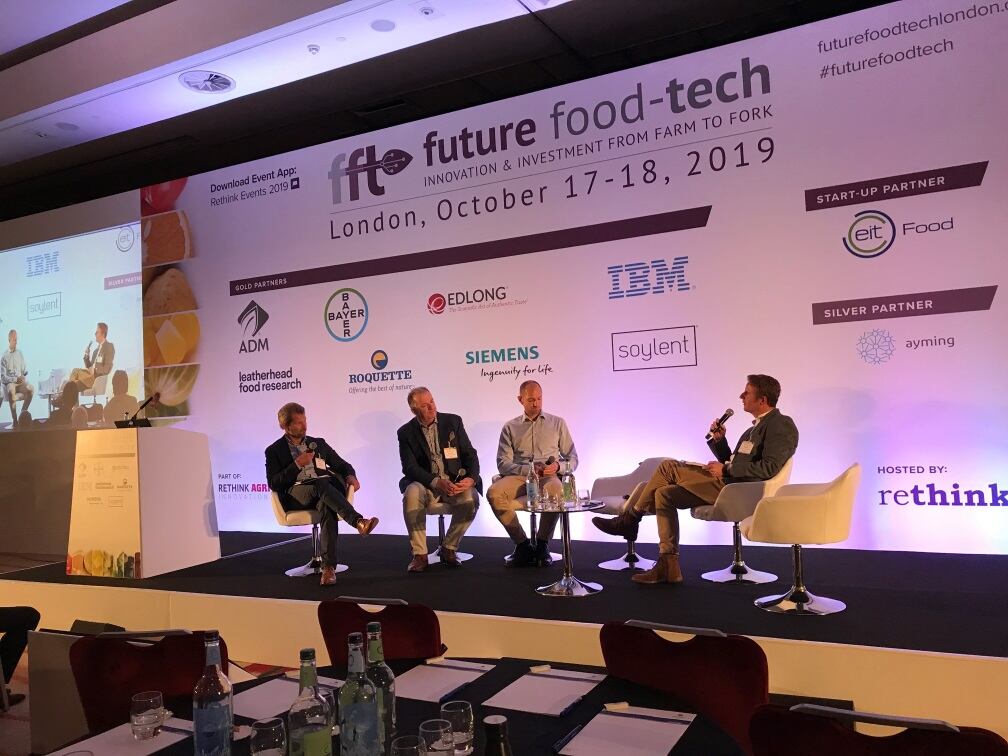Industry players tapping into the meat-free movement joined a panel discussion during the Future Food Tech summit in London last week.
Chairing the panel, Ben Morris, technology of business editor for BBC News, began by saying this year seems to have been a ‘break-through year’ for plant-based diets in the press as there has been continuous positive coverage.
David Wagstaff, executive director for plant-based alternative company Just, best known for its JustEgg product, said the rate of change is such that he would expect many manufacturers to be diversifying to ensure a future-proofed business model.
“I’ve been in the food industry for 30 odd years and we are in a period of unprecedented change in terms of the decisions consumers are making.
“I think there’s some fantastic manufacturing companies out there that are looking to diversify and because of this, those looking to supply more plant-based solutions to their consumers may not need to have multiple different suppliers in order to provide different offerings.”
Jesper Juul Anderson, category area manager for Ikea Food, Sweden, explained that it’s important for the leading global corporations to get on board this movement as they have the power to create demand.
“Companies like Ikea can play an important role in creating demand where it doesn’t already exist.”
As such, Anderson said the Ikea team is working to change the food on its menus, most notable with the creation of a plant-based meatball dish to sit alongside its iconic Swedish meat-based dish.
“The meat ball is perhaps the best-known product that Ikea has. With our new plant-based version, we want to provide the same taste but healthier and more sustainable.”
Language creates demand
Wagstaff pointed out that its companies that serve many meat-eaters should remember the importance of language, as pointed out by Sophie Attwood, senior behavioural scientist for the World Resources Institute, earlier in the conference.
She explained that research into how descriptions influence sales of plant-based foods has shown it’s really important to get the right descriptive words to pinpoint what consumers hope to get from the food.
“It’s all about emphasising the positive in plant-based dishes and trying not to talk about the fact they are meat-free or that they are healthy or that they are for vegans or vegetarians.”
She added that words found to boost sales were those that described the provenance, flavour, and the look and feel of the food in a positive way.
Suppliers search
Wagstaff added: “I think if we can find the right partners in sustainability then we can use our size to create new capacities to cater to the plant-based demand.”
Ciaran Hickey, director of culinary EMEA for the Hilton Group, explained there is a big push to make the menus more sustainable and vegetarian-friendly at the global chain of hotels.
“Three or four years ago we realised we needed an active strategy to deal with the demand and in the last year to 18 months we saw a tsunami in demand and consumer awareness with people challenging traditional food and beverage offerings.”
He added that the new plant-based dishes have had ‘huge lift off’ across the regions.

Differing needs around the globe
However Hickey said that the differing consumer desires in different areas of the globe make the challenge all the more difficult.
“We let the different teams educate us as to whether there’s the demand in their region and what will work for their diners.”
He added that, in order to create popular plant-based dishes for the different regions, they see what are the best-selling dishes on the menu in that location and create a plant-based version of sorts.
Anderson said Ikea is in 52 different markets across the globe and the split between what customers want is ‘huge’.
“In Germany and Sweden many shoppers want us to have more plant-based alternatives. Other regions are luke-warm and in others there’s no real interest.”
Wagstaff added that he has to tune his product’s messaging according to the country and there are huge differences in the reasons why people choose plant-based options.
“One of the main reasons people buy plat-based in Europe is animal welfare.
“In the US, it’s about personal health and the environment. But ultimately people are thinking about their health and the health of the environment and they are intrigued to try new products.”
He also pointed out that taste and awareness are essential in any region.
Getting employees excited
Hickey explained that one big challenge is getting the chefs as interested in creating plant-based recipes as they are meat recipes.
“We have to educate the chefs on the ground as to the impact of this new wave of interest and make them realise it’s not just a fad but it’s a movement that’s here to stay.
“We’ve had to re-educate them to tell them the vegetarian option is no longer in the bottom corner of the menu, it’s in the main stream and it deserves just as much creativity as the meat dishes.”
The cost-price dynamic
Discussing the difficulties associated with getting the cost-price of plant-based options down, Anderson said he wanted to get his plant-based meatballs to a comparative price with the original dish, while Wagstaff and Hickey said their customers appear to be happy to pay more for a product that they know is healthier and more sustainable.
Wagstaff pointed out that he didn’t believe this would remain the case for long and said the suppliers will need to be able to scale up and reduce their prices but he added that he believes there will be ‘a wave of momentum that will enable that to happen’.




